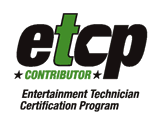 |
 |
 |
|
|
Update
On Technician Certification Program
This article, updated by Rob Rowlands, was originally written by Eddie Raymond and Bill Sapsis and first appeared in the Fall 2004 issue of Protocol, the journal of the Entertainment Services & Technology Association. USITT has a representative and alternate on the ETCP Certification Council and has committed $75,000 over the next three years to help fund ETCP. The Entertainment Technician Certification Program (ETCP) is a new, industry-wide program being developed by industry leaders. The governing body of the ETCP is the Certification Council. At the core of the council are the industry organizations whose presence ensures their members' voices will be heard during the development process. Representing potential candidates, those who employ them, and those in whose facilities they work, these organizations have embraced the benefits that personnel certification can bring to the industry. ETCP will create exams based upon identified bodies of knowledge, conduct those examinations, award certifications, and re-certify individuals. Two key areas have been identified for initial development - electrical skills and rigging skills. Two working groups have been meeting regularly for more than two years to lay the groundwork allowing ETCP to move forward. Dedicated experts have volunteered their time and efforts in order to improve the safety and efficiency of entertainment technicians throughout the industry. The Rigging Skills Working Group (RSWG) has compiled bodies of knowledge for arena-style and theatre-style rigging. The Electrical Skills Working Group (ESWG) is compiling the body of knowledge for entertainment electricians. The Electrical Skills Working Group is chaired by Ken Vannice, engineering project manager for dimming and compliance manager for Leviton - NSI/Colortran. The Rigging Skills Working Group is co-chaired by Rocky Paulson, president and general manager of Stage Rigging, a Freeman Company; Eddie Raymond, vice president of IATSE Local 16 in San Francisco and assistant to the business agent with a primary focus on training; and Bill Sapsis, president of Sapsis Rigging, Inc. Developing the Tests AMP, a psychometric (test and measurement) firm was hired to lead ETCP through the test development process. The examination is not something that simply gets thrown together. Each step in the process is critical to the program's success. ETCP is committed to delivering a quality program by following nationally recognized criteria for certification development. The first step in the development of the examinations is the job analysis. This analysis helps to define the knowledge and skills necessary for the safe practice of entertainment rigging and electrical crafts. Job analysis is the foundation upon which to build a viable and rigorous certification examination. The first job analysis focused on rigging tasks based on importance, time spent, and consequence of error. A group of subject matter experts (SMEs) met at AMP headquarters in early September to conduct the rigging analysis. The results of that meeting were developed into a survey by AMP that was sent to approximately 500 experienced riggers by e-mail in the fall of 2004. The results of the survey will be used by the SMEs and AMP to determine the content areas of the examinations. The first examinations for arena-style and theatrical rigging are tentatively scheduled for the fall of 2005 at the ETS-LDI show. The ETCP Council is developing the eligibility requirements to sit for the examinations and expects to have candidate handbooks and application materials available at the upcoming USITT Conference & Stage Expo. Information will also be available on the ETCP website (www.etcp.esta.org). If you have any questions or comments about the program, contact Katie Geraghty, ETCP Certification Director, at 212-244-1505 or kgeraghty@esta.org. |

USITT's support for ETCP entitles
it to use this special logo. Several other organizations
and businesses are also providing financial support
to ETCP. |